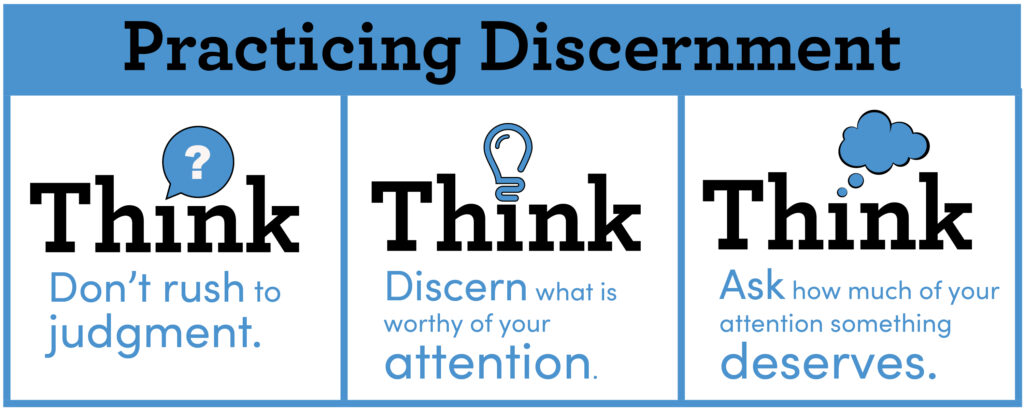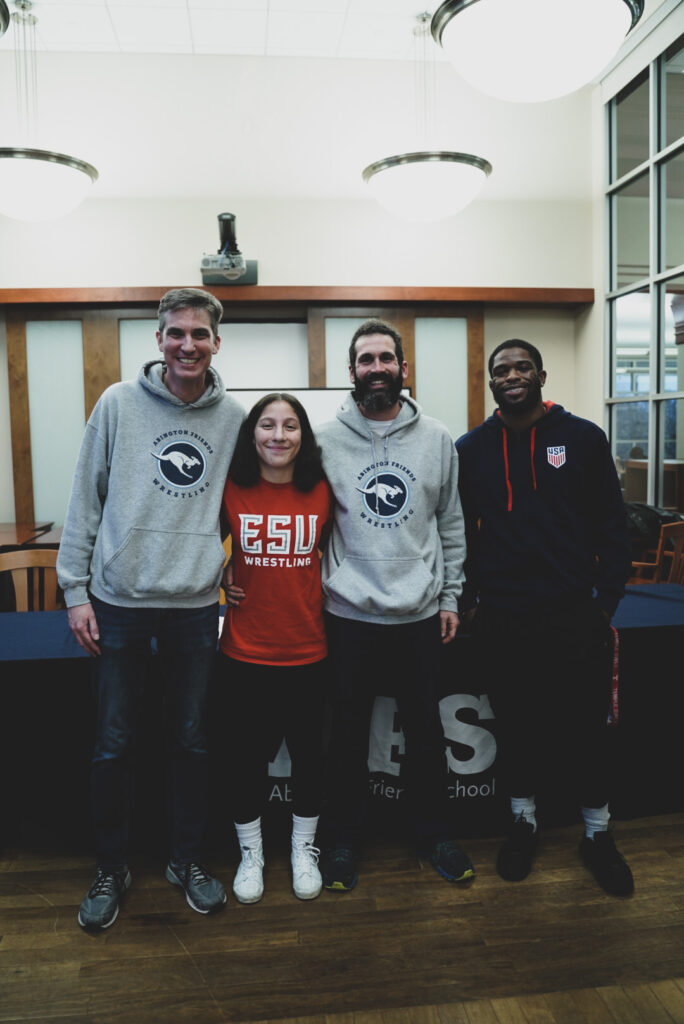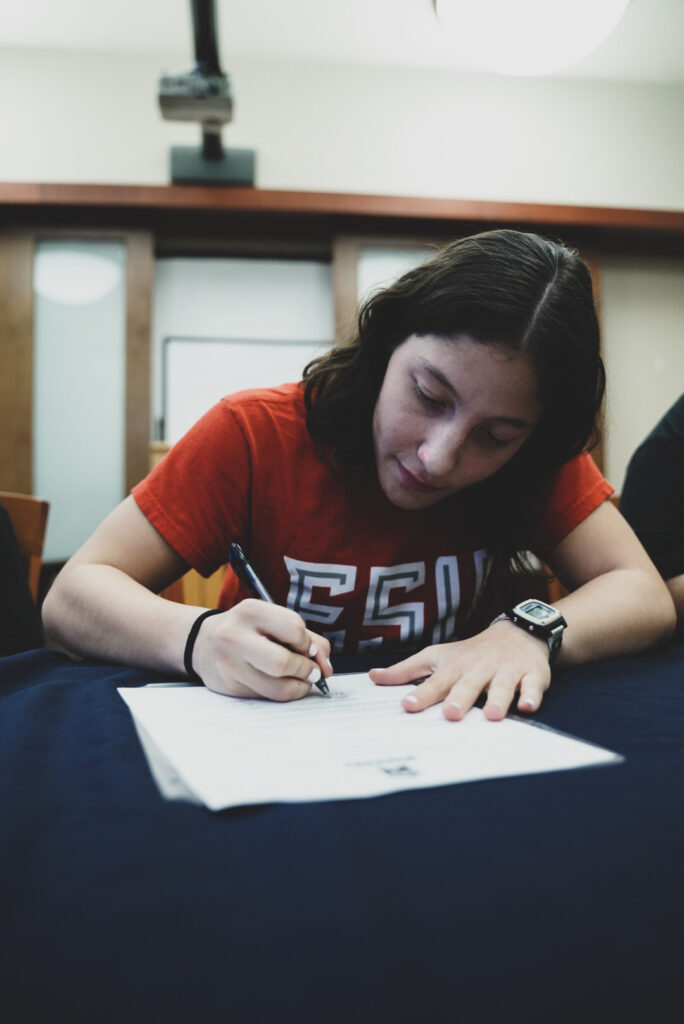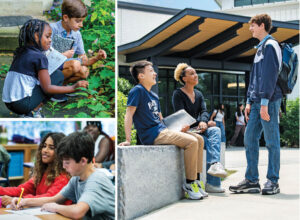Archives: Featured Stories
The Monster is a Messenger: Seventh Grade Horror Stories Ignite Screams, Laughs and Conversations
The Healing Powers of Sound and Silence: Jenny Burkholder and Roseanne Liberti on Quakerism, Podcasting and the Art of Storytelling
AFS Students Launch Newspaper The Blue and White
Why Focus on Student Choice? Adena Dershowitz on the Sense of Accomplishment
What Role does Dignity Play on Campus? Mikael Yisrael on Developing a Culture of Dignity
AFS Senior Grace Barlow Wins WHYY Youth Media Award
On Saturday, April 22, 2023, Grace Barlow ’23 received a WHYY Youth Media Award for her work documenting the UC Townhomes protest in 2022. Already an accomplished writer, producer and budding journalist at 18, Grace sits down with AFS to talk about her journey thus far and where she wants to go next.
Tell me a bit about your project that won a WHYY Youth Media Award.
GRACE: Last summer, I produced a story as part of WHYY’s Young Journalism program about the UC Townhomes protests. Dozens of families were being uprooted from their homes due to development in University City, so we went down to West Philadelphia and interviewed the people who lived in their homes, and how $800—the amount Philadelphia would give them for their homes—how that’s not even enough for a one bedroom apartment, and many of them were part of four-person families.
Out of 8,000 submissions to the WHYY Youth Media Award, we were selected as one of a hundred—and then incredibly we won.
What is it about journalism that appeals to you?
GRACE: In my sophomore year at Abington Friends School, we were all struggling with the pandemic, so I created a mental health panel to talk about the benefits of seeking mental health treatment. I also really wanted to highlight African American therapists and clinical psychologists on my panel, and we talked about mental health and COVID’s impact on young people.
Creating that panel, interviewing people, even sending scheduling emails—it felt incredible. And then gaining national news recognition from 6ABC—I mean, I got to speak with Tamala Edwards; she is out there pursuing stories every day!
I applied to and attended the Acel Moore Journalism Program in my junior year. He was one of the first black journalists at the Philadelphia Inquirer, and he made an enormous impact on people of color in journalism. To honor his impact, the Philadelphia Inquirer put together this workshop to help people of color begin their career in journalism with a network of people who want to help them succeed. African American journalists from WHYY and The New York Times would come to the office downtown and talk to us about their professional journeys. We were assigned a mentor who helped us to write our own story on whatever topic we wanted.
What was it like writing a piece with a mentor for the Inquirer?
GRACE: Something that I learned is to be a diligent writer. Like in order to write well, you have to write diligently and you cannot give up on your story. There were several times when I questioned whether the story was good enough. But it was, and the community loved it, the Inquirer loved it, and I could feel by working through the critiques I was given, I learned a lot about myself and my stamina and my confidence in pursuing a career in journalism.
I wanted to write about Kareem Rosser because he made such an impact on the Abington Friends community when he visited. We read his book in two classes—African American Literature and Echoes of Black Culture—and it really affected a lot of our students of color and students who feel insecure or experience oppression through, no matter what they are going through and how they identify.
Are you pursuing any other stories right now, either in the next few weeks or over the summer?
GRACE: I actually do. I just got an interview with Mayor Wilson Goode, and we plan to talk about the MOVE bombing, which is something that we’ve been talking a lot about in one of my classes. I will not only connect with him for a school project, but I also plan to write a story about what was running through his head as all of this was happening.
Also, I want to profile Derek Green, who just ended his 2023 Philadelphia mayoral candidacy. To me, he had this great platform highlighting gun laws, safety and gentrification in Philadelphia, and I want to know what it means to run for mayor, why he chose to suspend his campaign, and what are his next steps going forward.
What are you most excited about after graduating in June?
GRACE: My four years at AFS have shown me that the sky is not even the limit. AFS really welcomed me with open arms and gave me so many opportunities to lift my voice and express myself especially with organizing Black Excellence Night and clerking Black Student Union, and I hope that I can inspire other young black girls who are here at AFS that it is possible, and to never be discouraged no matter how you identify. Just keep going.
What Deserves our Attention? Dan Taboada on Helping Students to “Pause and Think”
Does information overload impact our ability to think critically?
What deserves our attention? A few weeks ago, I read an article in The Atlantic, “America’s Teenage Girls Are Not Okay.” A worthwhile read? Maybe. But why read this article as opposed to the dozens of similarly titled articles that have been published over the past month? How do I know that the information in this article is factual, relevant and above all useful? What would happen if I decided to read all of the articles pertaining to why teenagers were struggling in today’s world? Most likely, I would feel overwhelmed by the sheer volume of information and the many arguments would blend together until I am left anxious and powerless to think for myself.
We live in the information age. We have the world’s databases at our fingertips, giving us the ability to learn just about anything we desire with the click of a mouse. Yet, this is not the most consistent way we consume information.
Learning is meant to be an active process of inquiry, yet it has turned into a passive habit of absorption. We receive a barrage of information from our many insistent devices at all times of the day and night. (I may throw my phone against the wall if I receive one more push notification from the New York Times or ESPN for a “Breaking News” moment that turns out to be thoroughly unimportant.) Even when we actively search a topic in an effort to broaden our knowledge, our devices track these data points. The result? Curated feeds that are saturated with strings of similar sources and reinforcing viewpoints. This constant absorption of information—without time to synthesize, contemplate, or question—has a deleterious effect on both our kids and society.
We as a community need to find ways to help them recalibrate.
What would it look like if we asked our children to pause and think?
What does deserve our attention? It is reassuring to remember that Abington Friends School is in a unique position to act as a counterbalance to these competing forces that tend to scatter or even overwhelm our minds. By design, the Friends education system is built on contemplation and reflection, fostering deeper inquiry and a search for truth. As we consider our Quaker theme of the year—renewal—it is essential to refocus our intellectual lives by practicing discernment.
Think, think, think. Don’t rush to judgment. Question everything. Discern what is worthy of your attention, and how much of your attention something deserves.
We as adults need to model discernment for the children in our community. We need to show them how to filter information and apply thoughtful moderation in consuming that which is most useful for our lives. The Atlantic article mentioned above poses the question, “Why are Americans so mentally distressed even as they’ve become better at talking about mental distress?” Well, in our society, cottage industries pop up where there is demand. As Director of Student Support and Wellbeing, I receive endless offers from a variety of professionals claiming to be the solution. They claim to hold the secret to managing stress, the key to developing grit, or the formula for encouraging a growth mindset. What I usually find is that the materials and programs on offer tend to simply rebrand more obvious or conventional ideas. While these programs are not harmful, they offer only a minor return on investment and certainly do not deliver on the groundbreaking or transformative experience being promised. In a life bounded by a finite amount of time and attention, we need to practice discernment: we must lift up ideas that not only solve a specific problem, but fit the culture and community of AFS.

The Fourth Century Center at Abington Friends School
The Fourth Century Center has a role to play in ensuring our students have the resources to engage with the digital age in a healthy and productive way. As laid out in our 2022–2027 Strategic Plan, the Fourth Century Center will be a “multidisciplinary center of learning and innovation that will richly support the lives of teachers as educators and program designers and fuel our thinking for transformative education.” Over the next three years, we will work to forge a path forward:
- Faculty will research and apply the most effective methods to help students build resilience.
- The Fourth Century Center will host a series of workshops for families that will strengthen the partnership and collaboration between home and school.
- Students will be engaged in the process so they too have insight into the why and how that define what makes our community unique.
Dan Taboada is the Director of Student Wellbeing and Support at Abington Friends School. In his role, he works with families, students, and faculty to ensure all members of the community feel supported, experience a robust sense of belonging and achieve their full potential. He also supervises and coordinates the learning support and counseling services provided to students.
This is the first of three articles that takes a deeper look into Abington Friends School’s envisioning of the Fourth Century of Friends Education. The Fourth Century Center addresses how schools must evolve to reflect the nature of childhood and adolescence in today’s world and how a Quaker education has the great potential to be a force for positive social change.
Respect and Resilience in High School Wrestling
To get to AFS’s high school wrestling practice, first you have to take a walk across campus. You’ll pass soccer and lacrosse players sprinting across Smith Field, green Wilson balls bouncing on the tennis courts, and baseball and softball players drilling on the diamond. You’ll enter the Triangle Gym, where on the first floor, students practice shooting three-pointers on the basketball courts. But if you climb the second floor, you’ll find blue mats lined wall-to-wall, ready for students to pair off, shake hands, square-up, and wrestle. Being on the second floor of the farthest corner of the campus, it’s hard to stumble upon wrestling practice—to get there, you need to seek it out.
As she approaches graduation, Bella Washington-Vasquez ’23 thinks about how she had started wrestling almost by chance. She didn’t seek it out as she did with other sports. If you told her as a 6th grader that she would one day sign a National Letter of Intent committing to being a scholarship wrestler at East Stroudsburg University, she might not have believed you.
“All I knew was that I wanted to be a three-sport athlete,” Bella explains. Justin Solonynka was the Middle School wrestling coach at the time, and Bella credits him for getting her involved. “He told us to just try it. If we liked it, we could play; if we didn’t, we could stop. And I didn’t want to stop.”
On the coaching side, Varsity Coach Brandon Johnson and Middle School Coach Dave Robinson know exactly how that feels. Both men wrestled in high school, and then tried to find a substitute sport in college—with no luck.
“There’s nothing else like it,” Brandon says. “Once you’re on the mat, it’s hard to leave.”
“Six Minutes of Absolute Grappling”
What makes wrestling so demanding also tends to be what makes it so appealing to many athletes. It’s a one-on-one competition where you have to physically grapple with another person for several minutes at a time; the meets are loud, and the contact is sweaty. One might think that it’s a decidedly non-Quaker sport. But as fellow AFS wrestler and alum Clay Lewis ’22 writes in an article for the Friends Journal, so much of wrestling is about respecting your opponent and seeing their dignity. “Every wrestler will acknowledge and respect the effort it takes to go out on the mat,” writes Clay. “This respect creates a community where even if someone loses a match, everyone recognizes that both wrestlers worked doggedly to get to where they are.”

Wrestling is defined by this strong tradition of sportsmanship—before each match, you make eye contact with your opponent and shake their hand, a ritual that grounds the match in mutual respect.
“Wrestling is hard,” Dave admits. “There’s a lot of getting crushed and slammed and thrown. It’s physically demanding and requires an indescribable amount of energy. It’s not for everybody—but no sport is! Most people don’t know if wrestling is for them because they’ve never tried it. They grow up playing basketball with their friends; they play basketball in PE in the winter; they know all about basketball; but they don’t know about wrestling.”
Throughout Middle School, Bella got to know quite a bit about wrestling: her preferred techniques, the rules of folk-style wrestling, and that sometimes you had to wrestle co-ed—boys and girls facing off on the mat.
“When I was starting in Middle School, there were like 20 of us, and there were a bunch of girls. It was a really big team,” she explains. “Now in Upper School, I’m the only girl. That just means I need to pin guys instead of girls.”
While women’s wrestling teams are becoming more common, it is still rare to see at the high school level, and rarer still in independent schools. Notably, PA women’s wrestling at the high school level has gotten a major boost in recent weeks. The Pennsylvania Interscholastic Athletic Association (PIAA) recently saw its one-hundredth school district register a girls wrestling team, the threshold needed to officially sanction the division with state recognition. Looking forward to next year, PIAA will have a High School girl’s wrestling division.
When asked if it’s difficult to wrestle with all guys, Bella pauses. “Well, it used to be,” she admits. “I started wrestling on the Upper School varsity team in 8th grade, and it was definitely more difficult. I was this small little 8th grader trying to wrestle up. But the way I look at it, it made me focus on my technique, and I like to think that I’m stronger compared to some of the other girls I wrestle. It helps me to control the match better against them.”
The Rise of Women’s Wrestling
Women’s wrestling at the college level is not new, but it has only recently begun to receive its due recognition. In 2021, the University of Iowa became the first of the Power Five Division I NCAA programs to add a women’s wrestling program based on its club program. As of now, there are only four Division I teams in the United States, and like Iowa, they’ve all just started. Schools like East Stroudsburg, a Division II program, compete hard for talented wrestlers like Bella to strengthen their rosters.
Advancing to wrestling at the collegiate level, Bella is looking forward to having more women to wrestle with. “I had gotten used to going to girls tournaments pretty much alone,” Bella says. I warm up by myself; I wait by myself until I go wrestle. But a few weeks ago, I got to go to a tournament with a few Middle School girls wrestlers, and it was really cool to have my own little crew with me.”
up by myself; I wait by myself until I go wrestle. But a few weeks ago, I got to go to a tournament with a few Middle School girls wrestlers, and it was really cool to have my own little crew with me.”
The structure of the tournament allowed Bella to compete in the morning, then observe their matches in the afternoon and give them advice after.
“I know most of them because I would help out with the Middle School practice sometimes,” Bella says. “Being able to coach them was like a whole new experience and it even helped me to rethink some of my own techniques.”
Coach Brandon is quick to point out the mental benefits of wrestling. “I see a lot of kids who are shy, dealing with anxiety and depression, not wanting to come to school,” he says. “When I was in school, wrestling was what got me to want to go. It helps you get out of your comfort zone, but in a controlled environment: There’s nowhere to run on the mat.”
“It’s a great opportunity for us as Friends schools to rise to the challenge and make wrestling more accessible to those who want to try it out,” Dave adds. “The more Middle School students who join, the more they will learn whether it’s right for them. It’s a lot of hard work, but it’s incredible fun, and very rewarding.”
Staying Hungry for the Win
Off the wrestling mat, Bella credits AFS for introducing her to wrestling in the first place. “When I think back on some of the other schools I could have gone to, I don’t think I would have wrestled ever,” she says. What made AFS different, Bella reflects, is the deep connections she made with her teachers, the friendships she cultivated, that made her feel comfortable enough to try something a little different and go out for wrestling. It was the sense of mutual respect that made wrestling more than just grappling—that it felt like somewhere she belonged.
“I think wrestling is one of the hardest sports in high school ever, if not the hardest,” says Bella. She says it with a laugh, but there’s no mistaking the fire in her eyes as she stakes the claim. “You have all these soccer and basketball and baseball players saying that they’re the coolest or whatever. But there’s nothing like six minutes of absolute grappling with an opponent with no break.”
Since we spoke, Bella competed in the Girl’s Division of the National Prep Tournament, going 4-1 on the day and taking all four wins by pin. By securing a 3rd place finish, she completed her AFS Varsity Wrestling career as a two-time National Prep All-American.
What advice does she have for students—especially girls—who are thinking about wrestling? “I think hard work is always the most important thing,” Bella explains. “In Middle School, I was painfully bad at wrestling. I look back at videos and it’s actually like, really bad. But I stuck with it, I worked hard, I stayed late after practices, I worked with my teammates, and year-after-year, I kept coming back.”
Brandon agrees. “My big thing is not if they win or lose, but how did they lose or how did they win,” he explains. “I’m proud of them when I see that they went out there and left everything on the mat. That’s all I’m really trying to see. I want to see them try their best.”
“I have to stay hungry for the win, stay hungry for those championships, focus on making myself better and making my team better,” Bella argues. “Even if we don’t win as a team, we can win on the mat. Even if we don’t have every weight class, we can win every match. The main goal is to persevere.”
